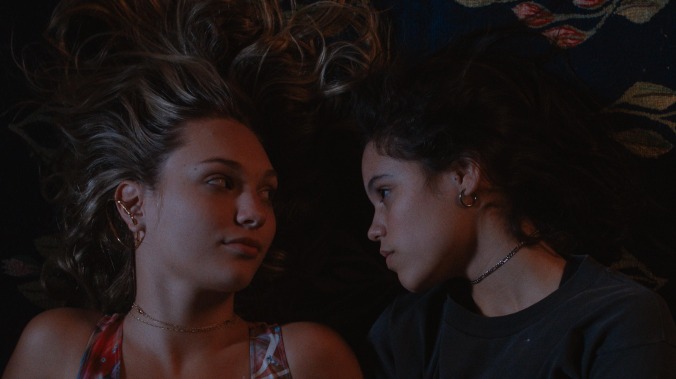The Fallout is a surprisingly restrained drama about the aftermath of a school shooting
A strong handle on tone makes Megan Park’s debut a January sleeper gem

Some achieve teen angst, and some have teen angst thrust upon them. In less-fortunate cases, a pivotal trauma can jump-start a young person’s maturation by challenging their base assumptions about a world no longer handling their innocence with kid gloves. Holden Caulfield turned bitter upon losing his brother. Lindsay Weir dabbled in atheism after her grandmother announced that she saw nothing in her final moments. And in The Fallout, Canadian actor Megan Park’s well-measured first feature as a writer and director, a school shooting triggers a model student’s rebellious phase.
Well-meaning zoomer Vada (Jenna Ortega, going places) has kept her head down and nose to the grindstone all her life, her idea of bad behavior limited to risking tardiness for some Starbucks before class. But when the notion that we could go at any moment transforms from an abstract to a horrifying reality, she’s moved to reassess her priorities. If every day might be your last, who would use it to memorize cell organelle functions?
We experience the semiautomatic rampage as she does, trapped in a bathroom stall for a few unbearable minutes near the top of the film. Through sheer chance, she shares her hiding spot with lower-tier TikTok star Mia (Dance Moms alumna and Sia affiliate Maddie Ziegler) and the sensitive Quinton (Niles Fitch). Aside from a general disapproval of the frequency with which this nightmare plays out in reality, Park keeps the politics to a dull rumble in the distance. She’s more invested in these kids’ personal, imperfect pathways forward through a thicket of grief.
There is a human toll beyond the death count, she submits, in how survivors reassess their lives and struggle to recognize themselves during the intimate hell of the aftermath. The Fallout makes this point without histrionics, speaking through little details of character while confining the maudlin stuff to a pair of scenes near the end. “I’m a chill, low-key kind of person,” Vada tells the therapist (Shailene Woodley) her parents have requested she sees. The movie is low-key, too—a winning approach to such delicate subject matter.
With a firm handle on tone, Park skirts the pitfalls of bad taste one might expect from a film that uses mass violence as a narrative device for a coming-of-age plot. In the first sign of her restraint, she gives the carnage a wide berth by leaving it as unseen noise, without the faintest whiff of the morbid fascination that still haunts the reputation of Gus Van Sant’s Elephant. She conveys the intense pain that’s left Vada numb through gestures closer to the banality and ritual humiliation of high school. On her first day back, Vada can’t bring herself to return to the lavatory without an anxious panic, and must hastily chart an escape route after pissing herself. Getting high on ecstasy between periods moves her to gnaw on a pen until it explodes in her mouth. Park understands that agony doesn’t preclude comedy, but rather accentuates the absurdity Vada’s never noticed before.
The core of the film is Vada’s gravitation toward Mia despite their differing social strata, as they form a bond over their shared tragedy. “Popular hottie and bookworm learn to see each other as more than stereotypes” could’ve been dreadful stuff, but Park’s credible, unforced dialogue enriches the afternoons these girls share. (There’s no overstating the benefit teen films reap by accepting an R rating, allowing their characters to talk like kids actually talk today.) Unfortunately, the naturalism of Ortega and Ziegler’s performances does have the adverse effect of accentuating the phonier bits of drama, like Vada’s literal screaming into the void with Dad (John Ortiz) or her tension with the gay BFF (Will Ropp) restyling himself as a David Hogg type in the wake of tragedy. The twerpy li’l sister (Lumi Pollack) seems to have wandered in here from another, broader script.
Even so, it’s a shame that The Fallout has received a little-promoted streaming run in the dead days of January. Park’s got chops, and her work shows that off without drawing too much attention to them. She knows how to assemble and hold a wide shot, and use creative editing to condense visual information. (Eliding the funerals and instead piling up shots of In Memoriam cards in a small box is one such stroke of inspiration.) Moreover, she’s got something to say about Gen Z, a wave of adolescents staving off the nihilism they have every reason to adopt. On a dying planet, risking life and limb every time they walk into homeroom, they can find refuge only in each other.